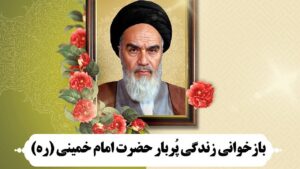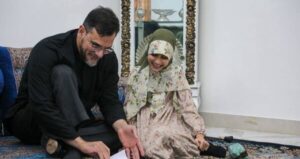
to report Missionary thought and culture base, Citizenship rights is a fundamental concept that emphasizes the equality of rights of all citizens, regardless of religious, ethnic and linguistic differences. In this regard, Ayatollah Sistani emphasizes principles such as human dignity, popular participation, and respect for the law, giving a special place to citizenship rights. His thoughts are not only an extension of Ayatollah Nayini’s speech in defense of citizenship rights, but also reflected in a new way in the governmental and social structure of Iraq.
According to Din Online’s narrative, Ayatollah Sistani considers the extent of citizenship rights beyond religious and ethnic boundaries and considers all citizens to have equal rights such as the right to life, freedom, security, and participation in destiny determination. He considers a government based on the will of all the people to be legitimate and emphasizes pluralism, respect for the law, and the peaceful transition of power. Also, in his opinion, the clergy has a supervisory and guidance role and should avoid direct interference in executive affairs.
Ayatollah Sistani’s thought on the subject of citizenship rights, reflecting the principles of Ayatollah Nayini, shows the link between the discourse of constitutionalism and the new legal approach. This point of view emphasizes that government, legislation and citizenship rights should be regulated on the basis of justice, equality and human dignity.
Mohammad Hadi Zahid Gharavi, in a note with a comparative approach between the thoughts of Ayatollah Sistani and Ayatollah Nayini, has shown how Nayini’s views were extended in Ayatollah Sistani’s speech. This note also deals with the connection of citizenship rights with the governmental and social structure of Iraq and highlights its place in contemporary political thought:
During the Safavid era, in addition to their prominent social presence, jurists had political presence and influence and held official and government positions, and they had taken charge of religious matters such as fatwas, judgments, and endowments and supervised them. Also, jurisprudents were appointed by the sultan to the position of Shaykh al-Islami, who had extensive duties and powers, therefore, during this period, jurisprudents discussed political and social issues in accordance with the era and the requirements of that period.
In other words, in this period, in addition to individual and devotional matters, the jurists discussed political and social issues, for example, the role and position of the sultan and the jurists in the monarchy, the scope and limitations of the jurists’ jurisdiction, the implementation of hudud and punishments, how to interact with People of the Book and… theorized and established the foundations of political jurisprudence, but with the fall of the Safavid dynasty, the presence and political influence of the clergy also decreased more or less, and as a result, thinking in The field of political jurisprudence became less important and once again individual and devotional rulings and topics were taken into consideration in seminaries.
Opposing and pro-constitutional jurists
During the constitutional period, political jurisprudence issues were once again taken into consideration, because with the beginning of the constitution in Iran, two major currents were formed among the clerics, a group led by Sheikh Fazlullah Nouri opposed and another group of clerics such as Akhund Khorasani and Mirza Hossein Nayini from They supported the constitution.
Sheikh Fazlullah Nouri clearly considers the acceptance of the constitution to be a cause of apostasy and supports the Shariah and legitimate laws and states in his treatise on the sanctity of the constitution: It is not possible for the Islamic state to come under the constitutional law, except by removing the Yad from Islam, so if any of the Muslims In this regard, he tries to make us Muslims constitutional, this is an attempt and action in the destruction of religion, and such a person is an apostate, and the decrees of the four apostates apply to him, whoever he wants to be, from A mystic or layman from the first al-Shoka or weak. This is al-Fatwa and al-Rai al-Dhi, la Azhn al-Mukhalif fieh and against wisdom and necessity. He continues to consider law writing as haram and heresy in religion and says: What is the meaning of law writing? The law of us Muslims is Islam.
Against this group, constitutionalist jurists also defended the constitution with jurisprudential arguments and specifically supported the Shura and the necessity of drafting a constitution. As an example, Akhund Khorasani writes about the Shura: matters of customary and hasbiyyah matters during the time of absence are entrusted to the minds of Muslims and the trust of believers, and the example of this is Dar al-Shura of Kabra. And in another place, he clearly states: It is essential for the religion that the government of the Muslims during the absence of Hazrat Sahib al-Zaman, may God speed him up, is a Muslim president.
Nayini, who was one of the constitutionalist jurists, wrote the book Tanbiyeh al-Uma in defense of the constitution citing religious and jurisprudential principles. Regarding the necessity of the constitution, he says: In general, just as it is forbidden to record the actions of imitators in the chapters of worship and transactions without applying the practical messages in their hands and day-to-day actions to it, so is the recording of behavior in political affairs and state affairs. The curators and being under their care and responsibility without ordering the above-mentioned order is prohibited, and in fact, the basis of maintaining the limitation and responsibility based on it and the original principle in this chapter and the introduction is unique to the subject, for this reason it is obligatory. is
Therefore, it can be considered that the point of departure of the difference between legalistic and constitutional jurists is the position of the law and its relationship with religion, Sharia and jurisprudence. According to Dr. Firhi: The mystery of the modern state and the concept of law is a challenge that has been with the Iranian government and society since the constitutional revolution and has created important crises, some of which have emerged, and a more important part is like a fire under the ashes, waiting for conditions. They are volcanic (Modern Government and Law Crisis, 69).
Optical and optical extension
The story of the constitution and the jurisprudential conflict of the supporting and opposing jurists, although at that time it was a hot debate in circles and seminaries, but after a while it subsided and with the beginning of the Pahlavi reign, it was going to be forgotten, but with the beginning of Imam Khomeini’s opposition to Mohammad Reza Pahlavi and His exile to Turkey and then to Najaf and his dealing with the issue of religious authority while discussing the book of Sheikh Ansari’s sale and writing and editing it in the form of a book entitled Islamic Government (Province of Faqih) and finally the victory of the Islamic Republic got a new life. And since then, many books, articles and theories have been presented on the subject of agreement and opposition, Islamic jurisprudence, Islamic government, sovereignty and national governance, elections and dozens of other issues.
With the victory of the Islamic Republic and the supremacy of the theory of velayat al-faqih and the predominance of the Islamic political discourse, with a little tolerance, the Islamic government of Iran can be seen as an extension of the discourse of Sheikh Fazlullah Nouri, who emphasized the rule of Sharia law and did not attach much importance to the people in his theory of legitimacy. But on the other hand, the pro-constitution movement and the jurists and theoreticians who were more sympathetic to Mukhord Khorasani and Nayini tried to present a democratic interpretation of the jurisprudence and Islamic government and emphasize the role of the people and national governance, but in practice they did not find much success and could not. Put your theoretical foundations into practice.
This was not the whole story, and Nayini’s discourse was not entirely successful, because in the neighboring country, after the fall of Saddam and the crises that entangled the country of Iraq, there was a jurist who was familiar and sympathetic with the principles of political jurisprudence of Makhund and Nayini, who, ironically, through the teacher self; Ayatollah Khoei was also considered a student of the Nayini school, he was the authority of the Shiites and the head of the Najaf seminary, and with his opinions and positions that were rooted in religious and jurisprudential foundations, he was able to bring Nayini’s thoughts to the fore to some extent, and hence it can be He believed that Ayatollah Sistani’s discourse is an extension of Nayini’s discourse.
Ayatollah Sistani and citizenship rights
Citizenship rights are one of the emerging concepts that are receiving more attention today. These rights are based on being a citizen and a member of a political society and within the framework of the nation-state, and they are called those rights that the general public has against the government, and the government, in turn, enforces laws and uses tools and facilities. And the lever of power he has is responsible for providing them. Therefore, citizenship rights have individual and social dimensions of a citizen, and on the other hand, it has anthropological roots, political philosophy, and moral philosophy, because citizenship rights are based on the four principles of inherent dignity, freedom, participation, equality, and brotherhood.
Considering the position of Ayatollah Sistani as a jurist and authority of imitation and that his opinions are based on religious and jurisprudential foundations, an attempt has been made to first explain the importance and extent of citizenship rights from his point of view in the book “Ayatollah Sistani and Citizen Rights”. Then, the examples and foundations of citizenship rights are extracted from his messages, statements and interviews, and finally, on the occasion of discussing the rights of citizens, the duties of citizens are discussed from the perspective of Ayatollah Sistani. to be
According to Ayatollah Sistani, citizenship rights are very important; Because in his statements, messages and answers to journalists’ questions, words related to citizenship rights such as elections, participation, ballot boxes, respect for citizens’ rights, marches and peaceful protests have a high frequency. One of the important points in Ayatollah Sistani’s thought, which can be counted as one of his innovations, is that he considers the range of citizenship rights to be broad and believes that all citizens of a country regardless of religious, ethnic, racial and linguistic differences. They have equal rights as citizens.
In his statements and writings, Ayatollah Sistani refers to rights such as the right to life, the right to participate in determining one’s destiny, the right to assemble and march, the right to decent administration of the country, the right to a fair trial, the right to security, the right to benefit from social justice, the right to freedom, the right to privacy, The right to education has been emphasized.
In relation to the right to participate in self-determination, regarding the type of political system in Iraq with regard to the majority of Iraqi Shiites, he says: The desire of the Shiites is no different from the desire of other Iraqi people, and all Iraqi people want to enjoy their rights away from ethnic discrimination. Iraqis will choose the type of political system during the inclusive election process. For this reason, he considers a government that is based on the will of the Iraqi people with all sects and ethnic groups to be legitimate.
Regarding the role and position of religion in the Iraqi constitution, educational system and judicial system, Ayatollah Sistani believes that the representatives of the Iraqi people in the legislative assembly determine the role and scope of the presence of religion and that the Iraqi constitution should be based on fixed religious principles, moral values and social norms. It should be the people of Iraq, and of course, the principle of Shura, pluralism, respect and acceptance of the opinion of the majority by the minority and the peaceful change of power should also be taken into consideration in the law.
Regarding the presence of the clergy in politics, Ayatollah Sistani believes in minimal presence, expressing a general opinion and not interfering in minor matters. And he advises religious scholars to avoid entering into executive affairs and accepting political positions and to limit themselves to propagating the rulings of religion, guiding people and helping them.
One of the basic principles of citizenship rights is the inherent dignity of human beings. There is no explicit statement from Ayatollah Sistani regarding this basis, but in some of his works goals such as preserving human dignity and the spirit of Islamic Sharia have been introduced. He attaches great importance to the dignity of human beings and respecting their rights regardless of religious and ethnic affiliations and affiliations, and he believes that the fundamental and main goal of Islam is to establish and establish justice, equality and dignity among human beings, therefore it can be said that he is from the same point of view. He pays attention to “man” and on this basis, he rejects the narrations showing the permissibility of blasphemy against opponents and heretics.
Another important principle of Ayatollah Sistani is that one should treat people with tolerance and tolerance, in such a way that they do not feel offended. They consider and insist on complying with it.
He considers respect for the law and responsibility as one of the important duties of the citizens, and knowing that the Iraqi society has been governed by a dictatorial and totalitarian system for years, therefore the social character of the citizens has been suppressed and their responsibility has disappeared or is very weak. has been done, in his messages, he reminds the citizens of this duty and role.
منبع: www.khabaronline.ir








